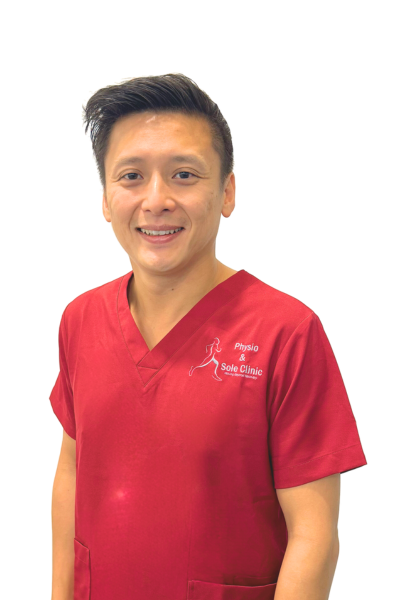Quick Overview on Wry Neck
Wry neck, also known as acute torticollis, is a sudden painful stiffness of the neck where the head tilts or locks to one side — most often noticed upon waking. It is typically caused by a locked facet joint or disc-related nerve irritation in the cervical spine.
At Physio & Sole Clinic, our AHPC-registered physiotherapists provide hands-on, evidence-based treatment for wry necks, including manual therapy, soft tissue massage, and tailored neck exercises. Most patients experience significant relief within 1–3 sessions, with full recovery typically achieved in 1–8 weeks depending on the underlying type.
| Session Duration 45–60 minutes | Recovery (Facet Type) 1–2 weeks | Recovery (Disc Type) 4–8 weeks |
| GP Referral Needed? No | Insurance Accepted Multiple Panels | Clinicians AHPC-Registered |
Written by
Chee Wai Siong Wesley
Director & Chief Sports Physiotherapist
He specialises in sports and musculoskeletal injuries, with a special interest in runners and shoulder conditions. With extensive experience in elite sports coverage and clinical education, Wesley is passionate about mentoring physiotherapists and promoting injury prevention.
What is Wry Neck?
Wry neck — medically known as acute torticollis — is a painful condition in which the neck becomes suddenly stiff and the head tilts or rotates involuntarily to one side, making it extremely difficult to move. The term “torticollis” derives from the Latin words tortus (twisted) and collum (neck).
It is one of the most common acute neck presentations seen in physiotherapy clinics in Singapore. The condition can affect people of all ages but is particularly prevalent in adults aged 20–40, and frequently appears after sleeping in an awkward position, a sudden movement, or exposure to cold droughts.
While the experience can be alarming — especially when the neck locks so severely that you cannot turn your head — wry neck is rarely dangerous and typically responds very well to physiotherapy treatment.
What are the Types of Wry Neck?
| Acute Wry Neck (Acute Torticollis) | Congenital Torticollis | Secondary Torticollis |
|
|
|
What Causes Wry Neck?
Common causes include:
- Sleeping in an awkward position
- Poor posture (prolonged desk work)
- Sudden neck movements
- Muscle strain
- Cervical joint irritation
- Stress-induced muscle tension
Less common but serious causes:
- Cervical disc herniation
- Infection
- Tumour
- Cervical spine fracture
What are the Symptoms of Wry Neck?
- Sudden neck pain
- Head tilted to one side
- Difficulty turning the head
- Muscle spasm
- Stiffness
- Shoulder discomfort
- Pain when driving or checking blind spots
Red flag symptoms (seek urgent care):
- Fever
- Severe headache
- Arm numbness or weakness
- History of trauma
How Does Physiotherapy Help with Wry Neck?
At Physio & Sole Clinic, physiotherapy focuses on addressing the root cause of muscle spasm and joint restriction.
Step 1: Detailed Assessment
- Cervical mobility testing
- Muscle tension evaluation
- Postural screening
- Neurological screening (if needed)
Step 2: Pain Relief & Manual Therapy
- Gentle joint mobilisation
- Soft tissue release
- Muscle relaxation techniques
Step 3: Targeted Exercises
- Neck mobility exercises
- Stretching tight muscles
- Strengthening deep neck stabilisers
Step 4: Ergonomic & Lifestyle Advice
- Workstation setup correction
- Sleep posture guidance
- Prevention strategies
What Results Can You Expect?
Most patients experience:
- Pain reduction within 1–3 sessions
- Improved neck movement within 1 week
- Full recovery within 1–2 weeks (for uncomplicated cases)
Chronic or recurrent cases may require longer management.
When Should You See a Physiotherapist or Specialist?
You should seek help from a physiotherapist if:
- Pain lasts more than 48 hours
- Neck stiffness restricts daily activities
- Pain radiates into shoulder or arm
- Symptoms recur frequently
See a doctor urgently if:
- Fever is present
- Severe headache
- Arm weakness
- Recent trauma
Wry neck (acute torticollis) may feel sudden and alarming, but it is usually highly treatable with early and appropriate care. Prompt physiotherapy can relieve pain, restore neck movement, and address the underlying joint or disc irritation to reduce recurrence.
If your symptoms persist, limit your daily activities, or keep returning, don’t wait for it to worsen. Book an appointment with Physio & Sole Clinic today for a thorough assessment and personalised treatment plan to help you recover quickly and safely.
Frequently Asked Questions on Wry Neck
Most cases resolve within 3–14 days. With physiotherapy, recovery may be faster.
Gentle movement is encouraged. Prolonged immobilisation can worsen stiffness.
Heat is usually more helpful as it relaxes muscle spasm. Ice may be useful in the first 24 hours if inflammation is suspected.
Yes. Recurrence is common if posture, ergonomics, or muscle imbalances are not addressed.
Most cases are benign and self-limiting. However, persistent or worsening symptoms require medical evaluation.















